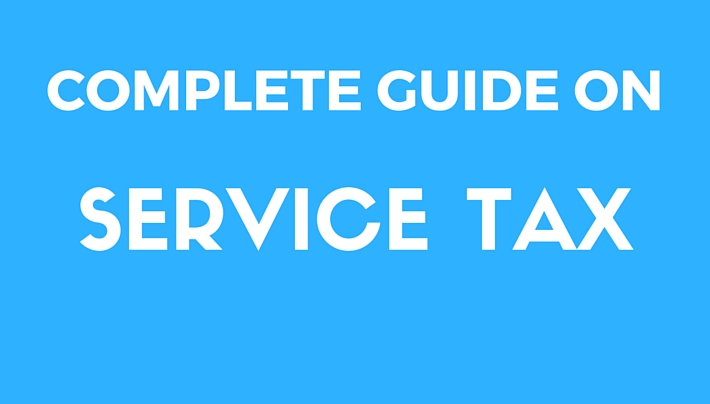Complete Guide on Service Tax

Service tax is a tax payable on services provided by the service provider. Similar to excise obligation, which is payable on goods fabricated, service tax is payable on the services provided. Service tax is payable by the provider of the service to the Government of India. The service provider can, however, collect this tax from the consumer of service (also known as the recipient of the service), and can file the same with the government.
It’s a kind of indirect tax because service providers pay the tax, and then recover it from the service receivers, who enjoy the taxable services.
Applicability of Service Tax
These taxes were introduced by then Finance Minister Mr. Manmohan Singh in 1994. Previously, taxes were payable only on a specified list of services, but Pranab Mukherjee while delivering his budget speech on March 16, 2012, announced that this tax would be applicable on all services except the negative list of services.
However, there are several composite services, for example, food served to the customers in the restaurant. Though VAT is already levied on the food, but apart from the food one also avails other services of the restaurant, like waiters and other staff etc. Therefore, service tax is also levied on food, making it almost impossible for the customer to differentiate between how much has been paid for the food and how much for the services.
In such cases, the government offers an abatement scheme under which the service tax is only levied only on a certain percentage of the total bill.
How to Pay Service Tax in India?
Service tax can be paid using a G.A.R.-7., a challan available only in specified branches of particular banks. It is necessary to fill the challan, putting up all the necessary information and submit it at your particular bank. The central board of excise and custom has also made available an e-payment facility for the service taxes to be paid online. For this, an internet banking account is required with any of the authorized banks.
Previously, service tax was charged on a cash basis, but now, only individual providers have to pay tax on a cash basis while corporations have to pay on an accrual basis. Service tax can be paid by individual and partnership firms on a quarterly basis, but for companies, society and trusts, it is mandatory to pay tax on a monthly basis.
How to File Service Tax Returns?
In general, there are two types of tax a service tax assessee needs to file – ST-3 Return and ST-3A Return. ST-3 Return is relevant for a registered assessee while ST-3A Return is applicable to those who make provisional assessment under rule 6(4) of the service tax rules, 1994.
You need to file ST-3 Return twice in a year on half yearly basis. You can submit the tax return by providing service details each month for which the return is filed. You need to provide these details separately with form ST-3. The application form needs to be accompanied by GAR 7 challan.
In case, you want to file your service tax returns online, the first thing you need to do is register with ACES (Automation central excise and service tax) by visiting the website of central board and excise custom. The site will send you a user ID and password on your e-mail once you are registered. With the user ID and password, you can log in to the site of central board and excise custom, and get access to form ST-1.
Afterwards, fill up the online form with the required information, and make an e-payment by using your bank. If you fail to file returns within 15 days, from the prescribed due date of returns, a penalty of Rs. 500 is levied. The penalty increases if service tax gets deferred beyond the prescribed date.
Service Tax Penalties
The central government may charge a penalty if you fail to meet the following conditions as per the provisions made under 76, 77 and 78 of the Finance act, 1994.
- A person will be liable to pay an extended fine of upto Rs. 2000, if they fail to provide the ST-3 Return within its due dates. The penalty is based on the period of delay.
- If a person fails to render details or appear before the central excise officer when called, then he/she will face penalty of Rs. 5000 or Rs. 200 per day after the due date, whichever is higher.
- Under section 77 of the Finance Act 1994, a penalty will be levied if a person fails to register his/her service while being a service provider. The fine may go up to Rs. 5000 because registration serves is an identity of Assessee, and its compulsory that the services must be registered.
- A person may be liable to pay penalty of up to Rs. 5000, if he/she fails to keep and maintain records of accounts and documents required by service tax law.
- If one fails to pay tax electronically, he/she must pay a fine that could extend to Rs. 5000. The fine is also imposed on non-payment or delayed payment of service tax.
- Penalty of up to Rs. 5000 could be charged if a person files an incorrect invoice, or do not support information with correct details.
- Penalty will be applicable if a person deflates the value of taxable services or deliberately provides a false statement for the services rendered.
As per section 80 of the Finance Act 1994, a person can be exempted from paying penalty fees if he/she can submit the reasons for the failure to pay service tax. It must be noted that insufficient funds or lack time are considered as inadequate reasons to waive the penalty.
